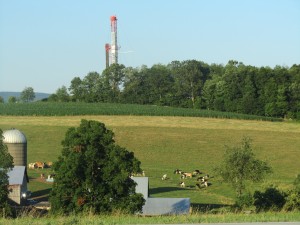What became of the quarantined cows in Tioga County?
-
Katie Colaneri

Kim Paynter / WHYY
A natural gas drilling rig rises in the distance above a cow pasture in north central Pennsylvania.
Two years ago, we told you about a Tioga County farm where heifers gave birth to dead calves after coming in contact with wastewater from natural gas drilling that had leaked onto the cow pasture.
In May 2010, the herd was quarantined by the state Department of Agriculture. The following spring, eight of the 11 calves did not survive, an unusually high number for farmers Carol and Don Johnson.
We followed up with the Johnson’s to see how things are going two years later. Carol Johnson said the quarantine has been lifted and for the past two seasons, the herd has not experienced any unusual reproductive problems. Only one calf died during a breech birth last spring.
“This year they seem to be straightened out,” Johnson said.
At the time of the leak, the well pad on their property was operated by East Resources. Shell has since bought the company and taken over operations on the farm. The Johnsons wanted Shell to buy the 28 quarantined cattle so they could start over with a new herd. Carol Johnson said they are still negotiating with Shell.
“When [the quarantine] was off, we didn’t get anything for them,” she said.
In 2011, Johnson took two of the calves to the Pennsylvania Veterinary Lab. Reports from the necropsies listed E. coli bacteria as the cause of death.
The Department of Agriculture reviewed the reports and concluded the calves suffered from Vitamin E and selenium deficiencies and that their deaths were not linked to the wastewater spill.
“These animals were receiving no selenium supplementation,” said spokeswoman Samantha Krepps in an e-mail.
Johnson, who has been farming for more than 50 years, said she always gives her cows a selenium supplement in a salt block. She believes the calves’ immune systems were compromised by their mothers’ exposure to the wastewater.
Dr. Michelle Bamberger, a veterinarian in Ithaca, New York, has studied the case. It is the only case in Pennsylvania where a herd was quarantined and, Bamberger notes, the only such case in the country. At the time, the Pennsylvania Department of Agriculture worried the beef could be contaminated and sicken people who ate the meat.
Bamberger said there is little research being done about the impacts of gas drilling on food supplies.
“We have no idea what’s in this [wastewater] and what contaminants could be picked up by the plants and then farmed and then fed to cattle and then fed to people or fed to people directly, so I’m very concerned,” she said.
The quarantine may be over, but problems persist for the Johnson’s. Carol Johnson said drilling left behind large rocks in their fields and wiring from seismic testing was left tangled in their hay bales, making it impossible to feed to their animals. Johnson and her husband Don, both in their late 70s, have hired a lawyer.
“Want damages for a loss of pasture, loss of crops, improperly built fences, gates that are way too small,” Johnson said. “It’s just the kind of stuff you run into when you’re dealing with someone who doesn’t understand farming.”
Johnson said Shell has offered to settle out of court, but the amount the company is offering is not enough for the couple to accept.
Company spokeswoman Kimberly Windon said in a phone interview that “Shell continues to work with the family while also continuing to operate a well on their property.” However, due to “ongoing negotiations” with the Johnsons, the company could not comment further.
















